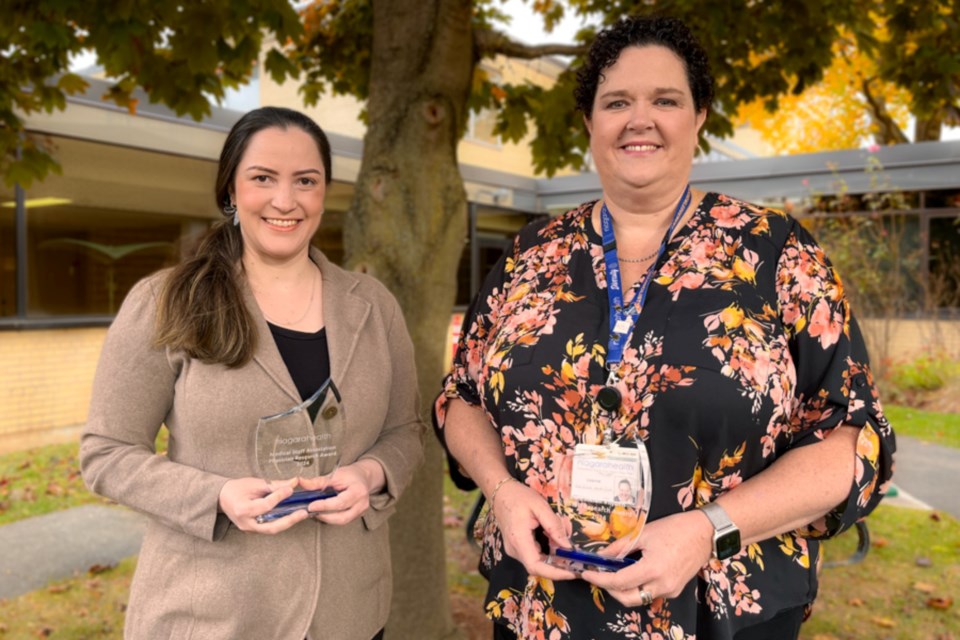NEWS RELEASE
NIAGARA HEALTH
************************
Leanne Kent has seen a lot of changes for the better in stroke care.
When she started her career with the Niagara Health District Stroke Centre at the Niagara Falls Hospital 25 years ago, care was based on rehabilitation without early treatment intervention.
By 2005, Kent started seeing the impact of research resulting in the widespread use of clot-busting drugs, giving patients a chance at greater recovery.
“It was remarkable watching the difference that thrombolytics made to patients in Niagara,” recalls Kent, Manager of the District Stroke Program. “Today we continue with this great work and add to it. We also ask, ‘what study can the patient be part of?’”
That includes six clinical trials launched in the last year by Dr. Danielle de Sa Boasquevisque, Stroke Neurologist, Physician Lead and Principal Investigator for Niagara Health’s Neurology research program.
Together, Kent, Dr. de Sa Boasquevisque and the entire Neurology research team – which includes co-investigators Dr. Alicia Mattia and Dr. Si You Sun, Nurse Practitioners Charmaine Martin and Sarah Chagani, and Research Co-ordinator Joanne Gorman – are driving more innovations in care while offering patients hope for their lives after a stroke.
In Kent’s case, that includes co-leading a comprehensive quality improvement project aimed at enhancing efficiency and team communication in stroke care.
She’s also worked closely with the Niagara Health stroke team to reduce door-to-needle times for thrombolysis or clot-busting therapy. And she’s worked on increasing access to endovascular therapy, which uses a catheter to restore blood flow to the brain, with Hamilton Health Sciences, a partner in the Central South Regional Stroke Network.
Patients who travel to Hamilton for treatment return to the Niagara Falls Hospital within 24 hours to continue receiving best practice stroke care close to home.
“You are getting the best stroke care possible. Receiving the clot-busting drug quickly and going to Hamilton for endovascular treatment, if eligible is a health care system working efficiently,” Kent says.
“Stroke care is constantly evolving,” she adds. “Research is what drives best practice and I ground my entire practice in it.”
That’s why she’s also been a strong advocate for Dr. de Sa Boasquevisque’s research, helping to secure space and resources to launch stroke clinical trials at the Niagara Falls Hospital, and ensuring the support of hospital labs, pharmacy and diagnostic imaging to do such research.
A leader in community hospital stroke research
Just over a year since launching the neurology research program, Niagara Health remains one of the only stroke clinical trial centres in a Canadian community hospital.
“These are trials that are very important for the community,” Dr. de Sa Boasquevisque says. “Many of the principal investigators on these trials are international experts who used to be my mentors and are now colleagues. It’s nice to have a close relationship with the patients going through trials and seeing that your institution is able to contribute to solutions rather than waiting for results from research done somewhere else.”
Originally from Brazil, Dr. de Sa Boasquevisque was drawn to Niagara Health by the opportunity to start a clinical trial research program after she completed part of her master’s degree and participated in fellowships with world-renowned physicians in stroke care at McMaster University. Her clinical trial portfolio is supported by her stroke neurology colleagues at McMaster, Hamilton General Hospital and the Population Health Research Institute.
Working tirelessly outside of her obligations as a physician, Dr. de Sa Boasquevisque launched the first clinical trial in September 2023 with funding the Niagara Health Knowledge Institute (NHKI) received from Accelerating Clinical Trials (ACT) Canada.
That first study, Edoxaban for Intra-Cranial Hemorrhage Survivors with Atrial Fibrillation (ENRICH-AF), is part of a global effort focused on preventing stroke in high-risk patients with an irregular heartbeat and previous bleeding on the brain.
Soon after, the program received funding to participate in the Librexia-Stroke clinical trial, examining the use of the blood thinner Milvexian to prevent additional strokes in patients who’ve already experienced acute ischemic stroke.
“We started with one trial to see how it goes, but I just liked it so much, I couldn’t stop,” Dr. de Sa Boasquevisque says. “These studies are very pragmatic and can apply in the real world. We need to bring them to Niagara.”
Both Kent and Dr. de Sa Boasquevisque were recognized for their research efforts earlier this year when the stroke team swept the NHKI’s research awards. Kent won the Dr. Johan Viljoen Staff Research Award for her quality improvement work while Dr. de Sa Boasquevisque received the Medical Staff Association Physician Research Award for her role in starting the clinical trials program.
Looking to the future
Their collective leadership and passion for stroke research sets the stage for continued innovations as the Stroke Centre of Excellence prepares to move to the new South Niagara Hospital when it opens in 2028. Their work also serves as a beacon for other neurologists to join Niagara Health.
Meanwhile, Niagara Health is on an ambitious path toward achieving Stroke Distinction Accreditation in May 2025. This rigorous and highly advanced program recognizes excellence in acute and inpatient rehabilitation services offering specialized stroke care.
“If you’re given the opportunity, you must move best practice forward,” Kent says. “That’s why we’re all here. If we can positively impact stroke care for patients in Niagara and beyond, that’s what we strive to do.”
***********************



